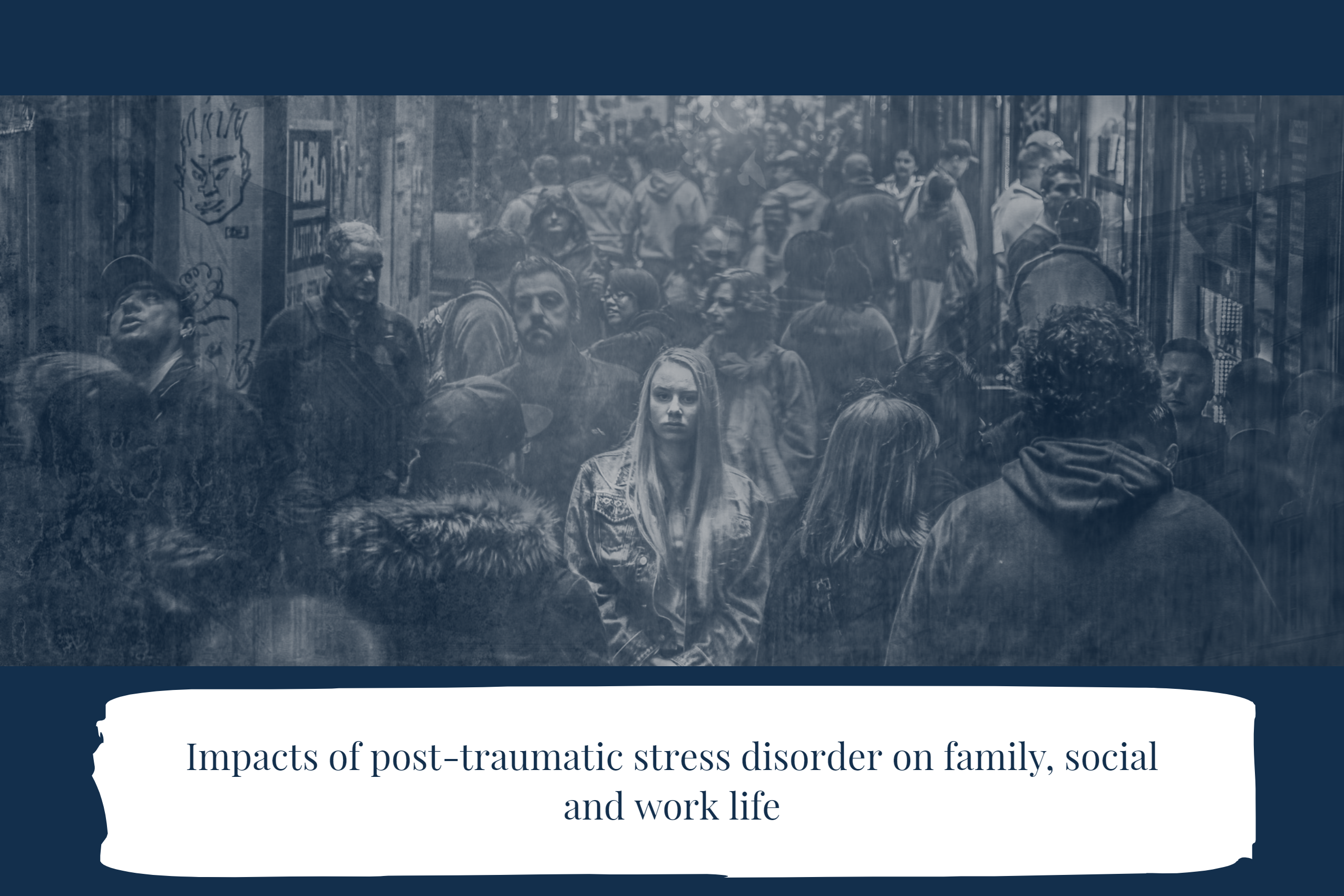Post-traumatic stress disorder (PTSD) can impacts a person’s ability to work, study, perform everyday activities or maintain relationships with family and friends. A person with PTSD can often appear disinterested or detached as they try not to think or feel in order to suppress painful recollections. They may cause the person to isolate themselves from participating in family life or disregard offers of help from the loved ones, which may lead to loved ones feeling ignored or rejected.
It is important to remember that these behaviours are part of the mental illness. It is essential that people with PTSD receives the support from their family and friends, nevertheless the person with PTSD thinking that they may not need help from loved ones.
Also, people with PTSD have higher rates of work absenteeism, a higher number of medical appointments, an increased likelihood of joblessness or underemployment, and difficulty in meeting work-related demands. These outcomes pressures incomes and cashflow, threatening the livelihood of the person.
A terrifying experience or witness can trigger post-traumatic stress disorder (PTSD). A flashback, nightmare, anxiety, and uncontrollable thoughts about the event could be some of the symptoms. Traumatic events may temporarily affect a person’s ability to adjust and cope, but with time and self-care, usually it gets better. A professional should be consulted if symptoms persist for months or even years, and interfere with the functioning. In order to reduce symptoms and improve functioning, it is crucial to receive effective treatment after PTSD symptoms develop.
There are a number of symptoms associated with post-traumatic stress disorder
A traumatic event may impacts post-traumatic stress disorder symptoms within a month, but sometimes they don’t show up for years. Social and work situations, as well as relationships, are affected by these symptoms. In addition, they can make it difficult to carry out normal daily activities.
There are basically four types of symptoms associated with PTSD. An intrusive memory, avoidance, negative mood and thinking changes, changes in physical and emotional reactions, and changes in physical and emotional reactions to stress are some of these symptoms. There are different symptoms for different people.
Memories that are intrusive
An intrusive memory may present with the following symptoms:
- Memory recurrence of traumatic events that is distressing and recurrent
- Playing out the trauma as if it happened again
- A traumatic event causes disturbing dreams or nightmares
- Reactions to something that triggers traumatic memories that cause severe emotional distress or physical discomfort
Keeping away from certain situations or environments
Avoidance may manifest as the following symptoms:
- Avoiding thinking about or talking about the traumatic event
- Keeping away from places, activities, or people that are reminiscent of the traumatic event
- An adverse change in mood and thinking
- Changes in thinking or mood can be accompanied by negative symptoms such as:
- Self-criticism, criticism of others, or criticism of the world
- A lack of hope for the future
- Lack of memory of important aspects of the traumatic event, including not being able to recall the details
- Inability to maintain close relationships
- The feeling of being detached from family and friends
- Disinterest in once-pleasurable activities
- Positive emotions are difficult to experience
- The feeling of being emotionally numb
The state of an individual’s physical and emotional well-being
The following symptoms can be a sign of a change in physical and emotional reactions:
- A tendency to get scared easily
- Watching out for danger at all times
- Overdrinking and speeding are self-destructive behaviors
- Problems sleeping
- Concentration problems
- Behaviors such as irritability, anger, and aggression
- Feeling overwhelmed by guilt or shame due to an action you have taken
Treatments for PTSD
There are three major treatments for PTSD, everyone is different and experience PTSD differently. It is important to talk to GP or the mental health practitioner in order to identify the best treatment. PTSD often leads to the onset of other issues, such as depression, or substance use disorder. It is important that the person seeks treatment for all of the illnesses.
- Psychological treatment- Talking therapies
- Physical treatments- Medication
- Exercise, mindfulness and self-help
Access Mental Health Awareness Books from Amazon: Mental Health Books












